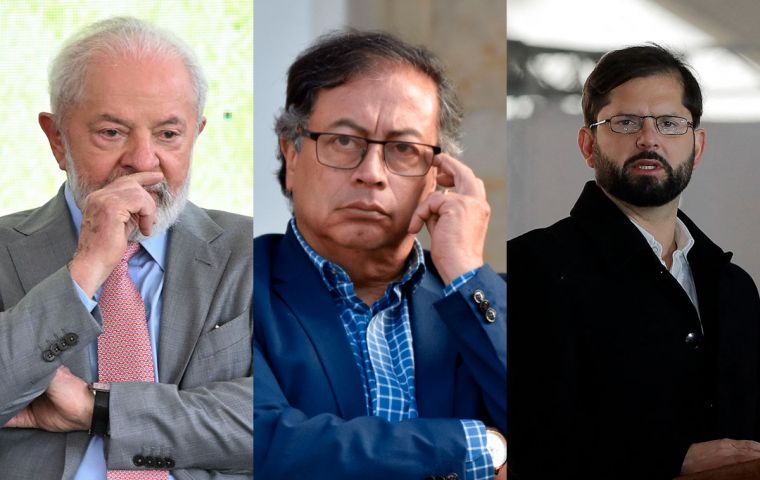
SANTIAGO, July 27 (NNN-MERCOPRESS) — Leftwing governments in South America seem to have turned their backs on Venezuelan ruler Nicolás Maduro after he forecasted last week that his country would be heading for a bloodbath if he failed to win Sunday’s presidential elections.
“He cannot threaten with bloodbaths,” Chilean President Gabriel Boric Font decried while requesting Venezuelan authorities to honor the outcome of Sunday’s polls at which opposition candidate Edmundo González Urrutia is believed to be the frontrunner according to most surveys. “It is for the good of the country and all of Latin America,” Boric insisted. The 74-year-old former diplomat Ginzález Urrutia became the opposition candidate after leader María Corina Machado was disenfranchised.
The Chilean leader thus joined Brazil’s Luiz Inácio Lula da Silva. “I agree and support Lula’s statements: one cannot threaten under any point of view with bloodbaths. What the leaders and candidates receive are baths of votes and those baths of votes represent popular sovereignty, which must be respected”, said Boric in a meeting with foreign correspondents.
Boric insisted that Lula, former Argentine President Alberto Fernandez, and himself were “profoundly democratic.” Earlier this week Lula admitted that he was “scared” by Maduro’s “bloodbath” remarks which also included the possibility of “a civil war.”
Maduro’s regime went back on its steps regarding an invitation to Fenández to perform as a foreign observer to the Venezuelan elections after the Argentine leader said that the elections’ results needed to be respected so that whoever won would become the next president. Such a comment was not welcomed in Maduro’s circles after 13 straight years in office.
“On the eve of this very important election, I call on the Venezuelan government and electoral power to guarantee the normal development of the electoral process with guarantees, especially for the opposition, granting unrestricted respect to the results that are duly accredited,” Boric underlined.
Boric also warned that if Chavism does not accept the results, “Venezuela would be in a totally discredited position before the whole international community.”
The leftwing Boric also said he was confident that Brazil, Colombia, and Mexico, all with governments from the same part of the political spectrum, would share his view regarding full respect “for popular sovereignty.”
Earlier this week, Lula underlined that “whoever loses gets a bath of votes, not a bath of blood. Maduro has to learn that when you win you stay, and when you lose you leave and prepare for other elections.” If Maduro wants to contribute to solving Venezuela’s growth problem and the return of those who left, “he has to respect the democratic process,” he added.
In this scenario, Brazil will not send any observers after Maduro questioned the transparency of the Brazilian electoral process just like then-President Jair Bolsonaro did in 2022, for which he has been banned from running for office for eight years by Brazil’s Superior Electoral Court (TSE). Admitting Maduro’s objections would be tantamount to conceding that Bolsonaro was not wrong. Hence, the TSE will also refrain from sending any observers to the Venezuelan process.
“In view of the false statements against the Brazilian electronic ballot boxes which, contrary to what Venezuelan authorities affirmed, are auditable and safe, the Superior Electoral Court will not send technicians to attend the invitation made by the National Electoral Council of that country…,” the TSE ruled. Brazil’s Electoral Justice “does not admit disrespectful statements or acts towards the transparency of the Brazilian electoral process, disqualifying with lies the seriousness and integrity of the elections and of the electronic ballot boxes,” it went on.
Colombia, ruled for the first time by a leftwing President such as Gustavo Petro, also declined to participate in the Venezuelan process when Bogotá’s intention had been to be there as Foreign Minister Luis Gilberto Murillo requesting a committee of experts to be assembled would show.
On July 23, Maduro questioned the electoral systems of Colombia and Brazil during an event in the State of Aragua. “We have the best electoral system in the world,” argued Maduro, who rambled about how electoral systems in the United States, Brazil, and Colombia were never audited, unlike Venezuela’s.
Campaigning closed Thursday in Venezuela. González Urrutia’s supporters took to the streets en masse and there is a feeling that this time around Maduro could be defeated at last barring any foul play.
The question as to what a defeated Maduro would do remains unclear: Would he accept the results and acquiesce to a peaceful transition? With no credible observers monitoring the elections, anything may happen. — NNN-MERCOPRESS




